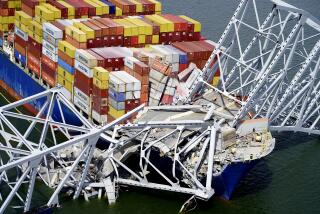But Passengers Refuse to Worry : Crowded Bangladesh Ferries Imperil Travelers
- Share via
DHAKA, Bangladesh — It was a scene often seen in Bangladesh, sometimes ending in tragedy.
Abdul Huq jumped aboard the double-deck ferry just as it started to depart for southern Bangladesh. He was the last of about 500 people to crowd aboard the river boat whose legal load is 300.
The ferry’s nine-hour, 147-mile trip to Barisal would take it past Maulvirhat, where a year earlier another double-deck ferry capsized with about 1,000 on board. Official records list 230 men, women and children dead in that disaster.
No Safe Way to Travel
That was of no concern to Abdul Huq, a 45-year-old businessman, as he settled himself among other passengers, luggage and cargo strewn about the upper deck of the steel-bodied boat.
“Thank God I made the launch,” he said. “I will never reach home and see my family if I worry about overcrowding. Traveling by bus or train isn’t safe either.”
Overcrowding is blamed for many of the ferry disasters that plague this land of rivers plied by about 3,000 ferry boats.
By newspaper accounts, 65 ferries sank or capsized between December, 1985, and this past November, leaving 640 people dead. With the monsoons now arriving, the danger of other accidents will rise.
‘The Rush Is Heavy’
The captain of the ferry, speaking to a reporter aboard only on condition that neither he nor his vessel be identified, said: “I know that my boat is overcrowded, but I am undone because the rush is heavy. We always try to follow the rules, but people anxious to get home will break them.”
Government officials say overcrowding is but one of the problems of river traffic in Bangladesh, which has 5,000 miles of navigable waterways and only half that in paved roads. The country, about the size of Wisconsin, has a population of 105 million.
Engineers say many of the ferries are faulty in design or structure, lack safety gear, are manned by unskilled crews, and do not have equipment for forecasting the sudden storms or tidal surges frequent in Bangladesh.
Inspections Abandoned
Government efforts to bring the ferries into line with regulations have been stymied.
In May, 1986, after 230 people died in the ferry accident at Maulvirhat, President Hussain Mohammed Ershad ordered inspections of all 125 of the big, double-deck boats.
But the inspection program was abandoned when boat owners tied up their craft in protest. Before the program ended, eight of the 24 boats inspected had been found faulty.
Dr. Mohiuddin Chowdhury of Dhaka’s Engineering University said the first problem with the ferries comes in faulty design and construction.
“The owners get approval for one kind of design but later go by their own whims,” he said.
Safety Rules Not Enforced
Another engineer, Khabirul Huq Chowdhury, cited the same problem and added: “This makes the balancing of the body of the vessels very difficult.”
In theory, the government can fine owners, confiscate boats and cancel crew licenses to enforce safety rules.
But in practice, only token fines are collected. In one recent 30-day period, authorities fined 25 ferries a total of 12,000 taka ($400) for breaking safety rules.
In a recent article on ferry disasters, the widely circulated weekly newspaper Bichitra said authorities do not have the legal machinery to deal with violations of safety rules.
Cases Piling Up
It said river police cannot stop a vessel that is violating rules until a complaint is filed against it. “But there is only one marine court where 2,000 cases are already piled up,” the paper added.
During the trip on the boat to Barisal, passenger Abdul Hye, a Dhaka business, suggested a way for the government to enforce safety rules.
“If you force the owners to pay enough compensation for loss of lives and even provide jail terms, then they may follow the rules,” he said.
The law provides for a six-month jail sentence for causing death in a ferry accident, but the penalty is rarely imposed.
Bad Weather Blamed
As for compensation, the government set up a committee last year to work out a ferry-passenger insurance plan. It has yet to make a report.
The Bangladesh Launch Owners Assn. denies that ferries operate overloaded most of the time and maintains that the country’s frequent, violent storms and cyclones are to blame for the tragedies.
Ziaddun Ahmed, the government’s deputy minister for ports and shipping, said the government hopes to launch a full-fledged program soon to prevent overcrowding and safety failures on ferries.
More to Read
Sign up for Essential California
The most important California stories and recommendations in your inbox every morning.
You may occasionally receive promotional content from the Los Angeles Times.












